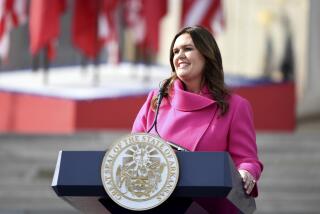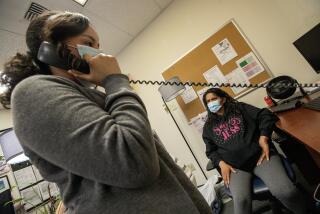Medicaid is helping poor patients get needed care, even as Republicans push to cut it, study finds
Reporting from Washington — As the Trump administration and congressional Republicans push for sweeping cuts to the Medicaid safety net, a study released Wednesday provides new evidence the program is significantly improving poor Americans’ access to vital medical care.
Low-income patients in Arkansas and Kentucky, two states that expanded Medicaid under the Affordable Care Act, are getting check-ups more regularly and delaying care because of cost less frequently.
Perhaps most encouraging, poor patients with chronic illnesses such diabetes are also seeking more regular care for their disease, according to the study, published in the journal Health Affairs.
By contrast, low-income patients in Texas, which has not expanded Medicaid through Obamacare, have seen few gains in access to care in recent years, the researchers found.
“With the changes being debated in Washington, we think this is very important to understanding the impact that [a repeal of Obamacare] might have on the most vulnerable people,” said Harvard University’s Dr. Benjamin Sommers, the lead author of the study.
House Republicans this month voted for legislation rolling back the Affordable Care Act that would slash nearly $900 billion in federal aid to state Medicaid programs over the next decade, a roughly 25% cut to a program that currently provides health coverage to more than 70 million poor Americans.
Senate Republicans are now debating their own version of the legislation.
Medicaid is a pillar of Obamacare’s program for guaranteeing health coverage and has helped drive a historic drop in the nation’s uninsured rate. Nationwide surveys suggest at least 20 million previously uninsured Americans have gained coverage since 2014.
The law makes hundreds of billions of dollars of federal aid available to states to extend Medicaid coverage to poor adults, a population that had been largely excluded from the government safety net program.
Medicaid eligibility historically was limited to certain vulnerable populations, including low-income children, pregnant women, the elderly and people with disabilities.
The number of states that have expanded Medicaid under the law has slowly increased to 31. But continued GOP opposition has left nearly 3 million low-income Americans without health insurance in the 19 states that haven’t expanded Medicaid, according to an analysis by the nonprofit Kaiser Family Foundation.
Many Republicans, including Health and Human Services Secretary Tom Price, have argued the program is ineffective.
But a growing body of research refutes that claim, including the new study, which relies on annual surveys of poor residents of Arkansas, Kentucky and Texas starting in 2013, the year before the Obamacare coverage expansion began.
“The ACA’s coverage expansion to low-income adults was associated with significant improvements in access to primary care and medications, affordability of care, preventive visits, screening tests and self-reported health,” the authors conclude.
In Arkansas and Kentucky, for example, the share of poor adults who had a check-up in the past year jumped by more than 12 percentage points between 2013 and 2016, increasing in Arkansas from 45% to nearly 57% and in Kentucky from 46% to 58%.
By contrast, in Texas, the percentage of poor adults who got a check-up remained at 51%.
Other research in recent years has found similar gains among Medicaid patients, according to a review of more than 100 studies on the impact of Obamacare Medicaid expansions conducted by the Kaiser Family Foundation.
Though some research has picked up less impact, “most research demonstrates that Medicaid expansion positively impacts access to care and utilization of healthcare services among the low-income population,” Kaiser’s review concludes.
ALSO:
More to Read
Get the L.A. Times Politics newsletter
Deeply reported insights into legislation, politics and policy from Sacramento, Washington and beyond. In your inbox three times per week.
You may occasionally receive promotional content from the Los Angeles Times.










